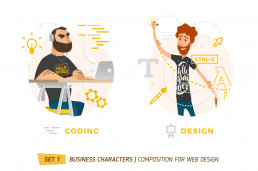Website Security
Congratulations, you have successfully launched your website but, is it all done? how secure is your website? and is it ready for business? These questions are the best to ask at the end of the project and just before launch. At this point we are thinking of potential cyberattacks, encourage potential visitors and maintaining your reputation. In this article, you are going to be informed of your new best-friend website security.
Now, What is Website Security? You might ask. This is an action or application taken to ensure the protection of website data is not exposed to cybercriminals or prevent exploitation of websites of any form, this is an ongoing and essential part of your website management.
Why is it Important and What does it Protect?
Website security is important as it protects as hacks, simple. Having security is just as important if not more than all other aspects. Look at it this way, no security results in potentially being hacked, being hacked can result in data loss, data loss results in a damaged reputation, possibly blacklisted, lawsuits and this can result in some huge fines.
Some of what you will be protected against are as listed:
Defacing: replacing your website content/material with other malicious data.
Malware: This can be used to steal sensitive information.
Blacklisting: The possibility of your website being removed for search engines.
All of the above shows lost and now results in favor of your or your business.
As for your users some of what the will be protected against includes:
Phishing: In most cases, this is found happening emails, however, this is now seen in various web browsers and is designed to trick the user into giving up sensitive information.
Malicious Redirect: In this case, the attack redirects the user from the intended site to another.
Stolen Data: Cybercriminals oftentimes attempt to save users’ data which may vary from as simple as your name to SSN and also payment information done online.

How Do You Secure Your Website?
There are many steps to take in securing a website, here goes to name a few:
Web Application Firewall: A web application firewall (WAF), stops automated attacks usually carried out by malicious bots that seeks to attack from your more vulnerable points to exploits or even slows down and crashes site through a distributed denial of service (DDoS) attack.
SSL Certificate: This certificate protects data collected by the website as it is being transferred to the server. Though considered a basic security measure a site on any browser labeled “insecure” is without an SSL certificate and is suggested to stay off.
The cost of an SSL certificate may vary depending on the site and their of at that moment. Some of the most popular sites to get your SSL certificate are:
- SSL.com
- Namecheap
- The SSL Store
- GoDaddy
- GlobalSign
- Digicert
Just to list a few and you will see that all sites offer to vary in prices.
Though we have only touched the surface of what website security is remember, “a breach in your website security cost more the longer it stays”.
Why Project Design Deadlines Are Important?
Every designer, client, or developer reacts differently to their projects. We must understand that deadlines keep us on point and gives adequate time for completion and revisit our clients and always happy for a spacious delivery ensuring that all is in place for the big launch.
The previous article would have defined web design as the layout, visual appearance, and usability of a system or a website. Having this vital area of the project on-point has your developers and designers with most of the tools they need to complete the projects. Now, will this eliminate communication such as email or time on the phone with client and developer/design? NO, as communication is of utmost importance and is critical in anything we do.

Deadlines help with workability, proper work distribution, and, most of all, up keeping with all your client’s needs for that big launch and also giving the developer the chance to have a task place in the correct order so the job can follow an orderly step.
Having an understanding in keeping with the project deadline is essential. One extended reason is, in most cases, the developer is working on multiple projects and has similar deadlines. This, I can assure you will change your smooth day real quick. Not meeting one can have you robbing time from one to feed the other, and we want to avoid that by all chance. It is essential for us also to take a look at having a realistic timeline. This allows us to ensure we are managing our time to have all done in the perfect time that best suits the clients; this allows maximum creativity and delivery.
A reminder; deadlines go both ways on-time feedback from the client with an on-time report from the developer and designer.
.
Difference Between Your Developer and Designer
Adding Clarity
We have had the question asked multiple times, why can’t the guy working on the back deal with the other stuff? Or, why are you talking of it like two separate parts?
Not to say your developer can’t he or she may be diverse and is able to take care of both web development and designing and that is great, but, a two in one is often rare and they are diamond once found. Your development team may speak with you as if they are separate entities and they are correct. These definitions will elaborate on what I am explaining here.
Web Developer
As is defined on techopedia a web developer is a programmer who specializes in the development of applications relating to the world wide web or distributed network applications, which typically run protocols like HTTP from a web server to a client’s browser using associated programming languages. A web developer is one who also makes your designs, the beauty of your websites be functional thus, enhancing your user experience.
Web Designer
Defined by technojobs a web designer is an IT professional who is responsible for designing the layout, visual appearance and usability of a website. A great designer is usually educated or equipped with graphical skills and a tad bit knowledge on other technical parts ensuring that your developer has an ironed path to go once the project is initiated.

For a more down to earth example your designer would be your architect in building your dream home. They know all the details where each room should be, the landscape of the yard space, and, even the facet for pipes and the style locks on all doors. Your developer will be the one to come in and ensure that electricity is in all plugs, water in all facets and the home is a dream-like you have envisioned.
Should You Know Your Designs Before The Start Of A Project?

Value
Time Is Money
This question is so often used but, lightly, as we say we have time. However, this is what I want all readers to remember; TIME IS MONEY. Yes, time is valuable most times too expensive to have a price tag so ensure your affairs are in order.
Destination
Are You Fully Equipped?
If you have read the previous article you would see how developers and clients alike are implored to have everything in place for the start-line of a project. This goes to be time-saving ensuring you are fully equipped and above all the map you have you are confident it will take you there (the delivery date). With that said, NO, you don’t need to have the designs before the start of the project, strange I know.


Progress
While This Is Being Done
This is a bit concerning for you I know as to prior writings. Reason for me to say this is, though you may not have the final design, you must have the layout, the know-how for all areas, and you must confirm all you need on your product as in regards to features. Having all this laid out for the developer(s) allows you to converse with your designers while completing the work.



